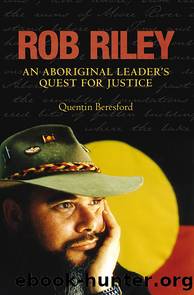Rob Riley: An Aboriginal Leader's Quest for Justice by Quentin Beresford

Author:Quentin Beresford [Beresford, Quentin]
Language: eng
Format: epub
Tags: Biography, Biography & Autobiography, Social Science, Anthropology, Australia & New Zealand, Political, History, Cultural & Social
ISBN: 9780855755027
Google: NlaMzEibZX8C
Goodreads: 3863393
Publisher: Aboriginal Studies Press
Published: 2006-01-15T13:32:35+00:00
Enemies Within: The End of the National Aboriginal Conference
When a journalist came to interview Rob Riley on 5 July 1985 at the empty Perth headquarters of the NAC, Rob had an air of defeat.1 By now he was tagged by the press as the âangry young man of black politicsâ for his uncompromising attacks on governments. On this July day, though, he had only parting shots to fire. His once bustling office had fallen silent. The telephones had been removed and his staff were out looking for work. Rob was alone, making a final assessment of the Aboriginal rights movement which he had worked so tirelessly to build. The NAC, which had been the focus of this movement under his leadership, had been demolished, torn apart internally by dissension and disagreement, and externally by the federal government.
The contrast in personal styles of Rob and the Minister for Aboriginal Affairs, Clyde Holding, was largely responsible for the drama that ended Robâs leadership. Rob was a conviction politician with an unshakeable political framework. He once explained his approach as âstraight forwardâ; a willingness to voice opinions âwhen Iâve felt it necessary to do soâ; ânot being intimidated by people no matter how senior the positionâ; and âforceful/aggressive in defending the N.A.C.âs positionâ.2 Holding possessed similar forcefulness and had proved his commitment to ALP policy on Aboriginal affairs over several years, travelling the country with an almost robotic willingness to talk up Laborâs commitments in the portfolio. Yet he also belonged to the school of realist politics and accepted the dictates of political survival; the Partyâs needs came first. Thus, Holding became an equally resolute defender of the federal governmentâs retreat on the heritage legislation, the public awareness campaign and the five principles of national land rights legislation. Opponents recall his desire to control events, his defensiveness when questioned, his intolerance of criticism, and his readiness to denigrate those who challenged him. âYou either did it his way or you were on the outerâ, is Michael Mansellâs recollection. Inevitably, Holding would have to confront the issue of how to deal with the uncompromising, articulate and dogged Chair of his advisory body.
Robâs relationship with Holding started cordially enough. Rob had congratulated his Minister for his sincere approach on the occasion of Holdingâs first NAC Executive meeting. However, the two menâs forceful personalities brought them into head-on clashes over ALP policy changes. Both relished a verbal joust and neither willingly took a backward step. Hostility between the two broke out in an NAC Executive meeting on 16 August 1984, when Holding was forced to defend the governmentâs backdown over the heritage legislation. Rob went public, accusing his Minister âof developing the Aboriginal Affairs Department at the expense of other Aboriginal bodies and of undermining the NAC and cutting its financesâ.3
The two appeared together on the ABCâs current affairs program Pressure Point. Rob challenged the Minister over his handling of the portfolio, complaining that he was bypassing the NAC as the voice of Aboriginal people. Presenter
Download
This site does not store any files on its server. We only index and link to content provided by other sites. Please contact the content providers to delete copyright contents if any and email us, we'll remove relevant links or contents immediately.
| Anthropology | Archaeology |
| Philosophy | Politics & Government |
| Social Sciences | Sociology |
| Women's Studies |
Nudge - Improving Decisions about Health, Wealth, and Happiness by Thaler Sunstein(7706)
The Fire Next Time by James Baldwin(5444)
iGen by Jean M. Twenge(5415)
Adulting by Kelly Williams Brown(4574)
The Sports Rules Book by Human Kinetics(4386)
The Hacking of the American Mind by Robert H. Lustig(4383)
The Ethical Slut by Janet W. Hardy(4251)
Captivate by Vanessa Van Edwards(3839)
Mummy Knew by Lisa James(3691)
In a Sunburned Country by Bill Bryson(3542)
The Worm at the Core by Sheldon Solomon(3487)
Ants Among Elephants by Sujatha Gidla(3467)
The 48 laws of power by Robert Greene & Joost Elffers(3291)
Suicide: A Study in Sociology by Emile Durkheim(3022)
The Slow Fix: Solve Problems, Work Smarter, and Live Better In a World Addicted to Speed by Carl Honore(3009)
The Tipping Point by Malcolm Gladwell(2922)
Humans of New York by Brandon Stanton(2873)
Get What's Yours for Medicare: Maximize Your Coverage, Minimize Your Costs by Philip Moeller(2730)
Handbook of Forensic Sociology and Psychology by Stephen J. Morewitz & Mark L. Goldstein(2705)
